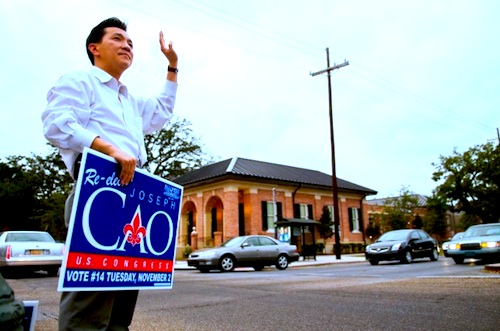By Joe Bendel. Go-getting corporate attorney Sam Chao is used to doing things his way. So is China. China’s bigger. Temporarily posted to the go-go city on the East China Sea, Chao is in for a steady diet of culture clashes in director-screenwriter Daniel Hsia’s Shanghai Calling, the 2012 Asian American International Film Festival’s opening night film, produced by this year’s Asian American Media Award recipient, Janet Yang.
Chao is not thrilled with his new assignment, but it is clear the partnership he covets depends on his performance opening the Shanghai office. His firm has come to China because that is where their most important client, eccentric industrialist Marcus Groff, has relocated. Never really in touch with his Chinese heritage, Chao does his level best to offend all his new colleagues as quickly as possible, particularly his assistant Fang Fang and his expat relocation specialist, Amanda Wilson. Unfortunately, Chao is going to need their help when makes a hash of Groff’s latest deal.
 For reasons that remain elusive, Fang Fang has eyes for the boss, whereas Chao finds himself attracted to Wilson. That would also seem to be an odd choice on his part, but it fits with Chao’s cultural identity. He is the whitest guy in the room, especially compared to Wilson and expat business community leader Donald Cafferty, the “Mayor of Americatown.”
For reasons that remain elusive, Fang Fang has eyes for the boss, whereas Chao finds himself attracted to Wilson. That would also seem to be an odd choice on his part, but it fits with Chao’s cultural identity. He is the whitest guy in the room, especially compared to Wilson and expat business community leader Donald Cafferty, the “Mayor of Americatown.”
Hsia’s screenplay is quite astute observing the dynamics of the American business community in Shanghai, contrasting the old school old guard, represented by Cafferty, with the yuppie upstarts. It definitely feels like Calling reflects an insider’s perspective. However, the vibe of the romantic subplots are a bit too Gary Marshall (even the poster looks a bit reminiscent of New Year’s Eve). At least Hsia keeps the cast of characters manageable.
Daniel Henney (geek-famous as Agent Zero in X-Men Origins: Wolverine) maintains an easy likability, even when he is cruising for his ego bruising. Likewise, Eliza Coupe is like a cross between vintage Meg Ryan and Bonnie Hunt as Wilson, the harried single mother. However, some of the brightest lights are found in the supporting cast. In what could have easily been a shticky caricature, Bill Paxton brings out the wit and humanity of “Mayor” Cafferty. Not just window dressing, Zhu Zhu (of the Chinese remake of What Women Want) plays Fang Fang with real spirit and sensitivity, while Geng Le has a nice understated nerd charisma as Awesome Wang, a journalist-fixer often hired by the expats.
Clearly, Calling is not interested in muckraking. When Chao crashes the factory bootlegging Groff’s revolutionary cell-phone, it looks nothing like the Foxconn NPR describes. Nor does the film have anything to say about China’s internet freedoms, or lack thereof. That might limit its documentary value, but it is rather pleasant as an East-meets-West courtship (of both the personal and professional varieties). Though becoming more common, such American-Chinese co-productions still must present challenges (indeed, such is the basic premise of the film), so 2012 honoree Yang’s contributions as producer are surely considerable. Recommended for those who enjoy light cross-cultural rom-coms, Shanghai Calling screened last night as part of the 2012 AAIFF’s opening gala and also on Saturday (7/28), but both showings are sold out, so good luck queuing stand-by.
Posted on July 26th, 2012 at 9:49am.






